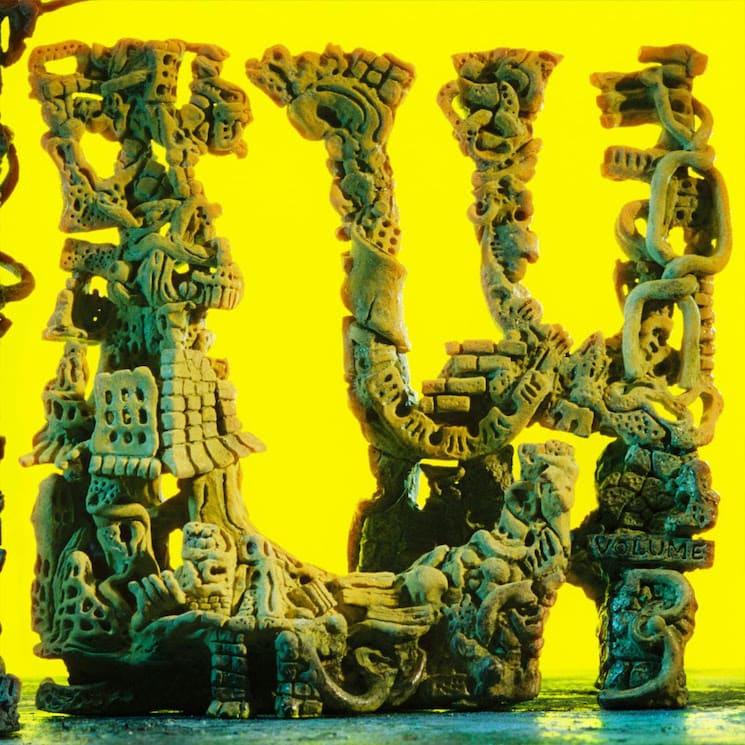On L.W., King Gizzard & the Lizard Wizard's 17th studio album, the supreme rulers of the Gizzverse answer all of their own questions and follow all of their own rules, as per usual.
The prodigal psych-rock sextet have not had the outlet of touring over the last year due to COVID-19, leaving space for the band to "reset" according to a press release. The result? A frenetic exploration of apocalypse-induced madness and ecstasy, dispersed throughout 19 tracks and released as two separate albums. With electrifying tension, K.G. — released last November — continued the endeavour into Middle Eastern-inspired tuning and modified instrumentation which started with Flying Microtonal Banana's experimental dabblings in 2017. As a follow-up to K.G., L.W. does more of the same.
This being said, it does not lack shifts and turns. "If Not Now, Then When?" boots off the record with a raucous stagger of drums and guitars, only to collapse into a steady lullaby prophesizing the end of days against an arcade-like backdrop. "O.N.E." offers a build-up in pacing as gradual as they come, and "Supreme Ascendancy'' sees a meditation of sorts escalate into a whirlwind of uninhibited rhythmic intensity. The album is Gizz at their peak of prophetic paranoia. Sometimes soft, sometimes synthetic, and occasionally embracing metal (including, but not limited to, a literal MRI machine, drawbridge, chainsaw, and anvil) L.W. is a space-bound call to action that refuses to slow down.
As the band enters their second decade, it is worth wondering whether quantity could be traded for idiosyncrasy. Have the prolific trail blazers already done it all? L.W. is true to the textures and tricks which fans of the band have come to know and love them for. That being said, L.W.'s ebbs and flows begin to dissolve into a musical landscape which, when looked at from afar, is less varied than ever. Their musical universe is one-of-a-kind, but K.G. and L.W. beg the question: have they gotten too comfortable there?
Perhaps repetition is a deliberate theme on these records, tied to the distinct laws of the space-time continuum on which the Gizzverse exists. Patterns abound here. L.W. closes with a sludgy, staticky, larger-than-life expansion of K.G.'s opening track, "K.G.L.W." It is hard to argue with self-assuredness so well backed up by technical prowess and intensity. L.W. may not boast many surprises, but it cements its makers as masters of their realm.
(KGLW)The prodigal psych-rock sextet have not had the outlet of touring over the last year due to COVID-19, leaving space for the band to "reset" according to a press release. The result? A frenetic exploration of apocalypse-induced madness and ecstasy, dispersed throughout 19 tracks and released as two separate albums. With electrifying tension, K.G. — released last November — continued the endeavour into Middle Eastern-inspired tuning and modified instrumentation which started with Flying Microtonal Banana's experimental dabblings in 2017. As a follow-up to K.G., L.W. does more of the same.
This being said, it does not lack shifts and turns. "If Not Now, Then When?" boots off the record with a raucous stagger of drums and guitars, only to collapse into a steady lullaby prophesizing the end of days against an arcade-like backdrop. "O.N.E." offers a build-up in pacing as gradual as they come, and "Supreme Ascendancy'' sees a meditation of sorts escalate into a whirlwind of uninhibited rhythmic intensity. The album is Gizz at their peak of prophetic paranoia. Sometimes soft, sometimes synthetic, and occasionally embracing metal (including, but not limited to, a literal MRI machine, drawbridge, chainsaw, and anvil) L.W. is a space-bound call to action that refuses to slow down.
As the band enters their second decade, it is worth wondering whether quantity could be traded for idiosyncrasy. Have the prolific trail blazers already done it all? L.W. is true to the textures and tricks which fans of the band have come to know and love them for. That being said, L.W.'s ebbs and flows begin to dissolve into a musical landscape which, when looked at from afar, is less varied than ever. Their musical universe is one-of-a-kind, but K.G. and L.W. beg the question: have they gotten too comfortable there?
Perhaps repetition is a deliberate theme on these records, tied to the distinct laws of the space-time continuum on which the Gizzverse exists. Patterns abound here. L.W. closes with a sludgy, staticky, larger-than-life expansion of K.G.'s opening track, "K.G.L.W." It is hard to argue with self-assuredness so well backed up by technical prowess and intensity. L.W. may not boast many surprises, but it cements its makers as masters of their realm.
